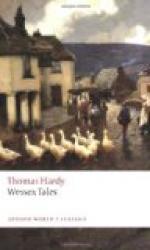Something delayed the arrival of the Wesleyan minister, and a young man came temporarily in his stead. It was on the thirteenth of January 183- that Mr. Stockdale, the young man in question, made his humble entry into the village, unknown, and almost unseen. But when those of the inhabitants who styled themselves of his connection became acquainted with him, they were rather pleased with the substitute than otherwise, though he had scarcely as yet acquired ballast of character sufficient to steady the consciences of the hundred-and-forty Methodists of pure blood who, at this time, lived in Nether-Moynton, and to give in addition supplementary support to the mixed race which went to church in the morning and chapel in the evening, or when there was a tea—as many as a hundred-and-ten people more, all told, and including the parish-clerk in the winter-time, when it was too dark for the vicar to observe who passed up the street at seven o’clock—which, to be just to him, he was never anxious to do.
It was owing to this overlapping of creeds that the celebrated population-puzzle arose among the denser gentry of the district around Nether-Moynton: how could it be that a parish containing fifteen score of strong full-grown Episcopalians, and nearly thirteen score of well-matured Dissenters, numbered barely two-and-twenty score adults in all?
The young man being personally interesting, those with whom he came in contact were content to waive for a while the graver question of his sufficiency. It is said that at this time of his life his eyes were affectionate, though without a ray of levity; that his hair was curly, and his figure tall; that he was, in short, a very lovable youth, who won upon his female hearers as soon as they saw and heard him, and caused them to say, ’Why didn’t we know of this before he came, that we might have gied him a warmer welcome!’
The fact was that, knowing him to be only provisionally selected, and expecting nothing remarkable in his person or doctrine, they and the rest of his flock in Nether-Moynton had felt almost as indifferent about his advent as if they had been the soundest church-going parishioners in the country, and he their true and appointed parson. Thus when Stockdale set foot in the place nobody had secured a lodging for him, and though his journey had given him a bad cold in the head, he was forced to attend to that business himself. On inquiry he learnt that the only possible accommodation in the village would be found at the house of one Mrs. Lizzy Newberry, at the upper end of the street.
It was a youth who gave this information, and Stockdale asked him who Mrs. Newberry might be.
The boy said that she was a widow-woman, who had got no husband, because he was dead. Mr. Newberry, he added, had been a well-to-do man enough, as the saying was, and a farmer; but he had gone off in a decline. As regarded Mrs. Newberry’s serious side, Stockdale gathered that she was one of the trimmers who went to church and chapel both.




